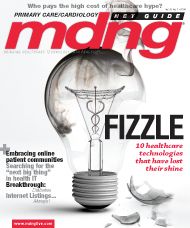4 Questions... with Alan Faustino, MD, president of NJR Healthcare
NJR Healthcare uses state-of-the-art technology and a non-traditional practice model to deliver high-quality careâ€"including routine medical exams, comprehensive physical exams, continuity of care visits, and even "VIP services"â€"to a diverse patient population in a variety of settings.
NJR Healthcare uses state-of-the-art technology and a non-traditional practice model to deliver high-quality care—including routine medical exams, comprehensive physical exams, continuity of care visits, and even “VIP services”—to a diverse patient population in a variety of settings.
1 What sets NJR Healthcare apart from a traditional medical practice?
We are a practice without walls. We provide healthcare to patients who are hospitalized or are in nursing homes and subacute rehabs, and we also make house calls. We provide services to patients who traditionally have had trouble getting healthcare—those that can’t easily leave their homes, or those whose insurance doesn’t pay well for office visits. We see everyone from indigent patients to patients with government-sponsored insurance to celebrities. It’s a great way to practice, particularly with the advanced technologies that enable our practice to be basically Internet-based and offer patients the ability to schedule appointments online and view their medical records anytime they wish.
2 What technologies do you use to support your practice? What are your staffing needs?
I developed, through Heritage Web Solutions, a rather sophisticated, secure EMR system. I researched online and found there was really nothing out there that fit the needs of my practice and my patients, so I developed my own system. I have a full-time staffer who helps patients who have problems with the website, schedules appointments, etc. I have a full-time EMR support employee for troubleshooting, and a full-time office manager who coordinates everything. Our two nurse practitioners and I all travel with laptops that have broadband access, so we always can access medical records online with our “virtual office” and send information on lab results in real time. We use BlackBerries to communicate with each other through our secure e-mail site.
3 Do you have a Web portal that patients can access to check lab results and other information?
Absolutely. Our website has an administrative site and a patient access site. Patients get a password and username that allows them to log in and see the date of their last visit and check their prescriptions, allergies, latest lab results, last consultations, etc. I once had a patient who was on vacation in Hawaii who developed chest pain and ended up in the ER. She has a rather extensive history, so she went online, right there in the ER, and was able to access all of her information. The ER physicians claimed they hadn’t seen anything like that before.
4 What do your colleagues think about your practice?
Do they view the technology you are implementing as a barrier between you and your patients? I’ve met with probably 95% skepticism. I’ve had to deal with specialists telling my patients they shouldn’t see me because I don’t have an office. But with the way my practice works, patients actually have more access to healthcare, not less. Doctors are very technically savvy when it comes to the latest tests and treatments, but unfortunately not so savvy with computers, the Internet, and other IT—I actually have colleagues who still don’t have a single computer in their office. They see me running around in the hospitals, talking to patients on my BlackBerry, and say, “What are you doing? You should be in front of them or you should be talking to them in your office.” It’s frustrating. We cannot stop the progress of information technology. We should be giving patients more access to healthcare, not less. We need to make our practices more efficient, not less. I think patient demand will drive this. I had a colleague tell me that although he is skeptical of what I am doing, he can already see how NJR is changing the way medicine is perceived in our area. His patients are saying, “The doctor who referred me to you has everything online. I can communicate with him online, so why do I have to wait two weeks to get information from you?” Virtual medicine is going to become a reality. Our local hospital system uses virtual neurologists to decide whether someone should get thrombolytic therapy. At fi rst I was skeptical, but when I saw it in action, I was completely amazed. It only gave me more motivation to do what I do. I have no doubt that this is the wave of the future in medicine.
Visit NJR Healthcare online at www.njrhealthcare.com. Contact Dr. Faustino with questions or comments at msopan@njrhealthcare.com.
